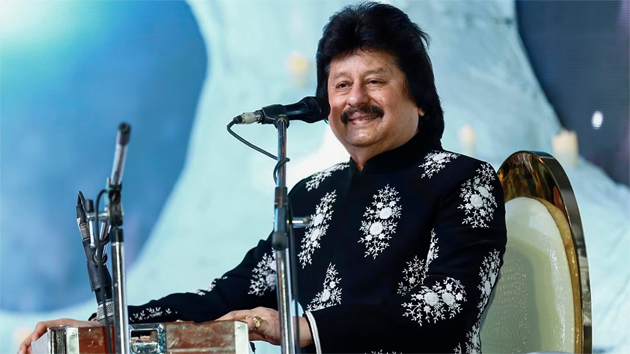By Tirthankar Mitra
A voice that breathed tunefulness, longing and heart break has been stilled forever. Pankaj Udhas is no more; but his ghazals will transcend generations. Udhas was certainly not a one-song singer. But whenever one takes his name, the song Chitthi Ayee Hai comes to mind. It was a song of authenticity conveying a father’s feelings for his expatriate son. There was an accessibility about it which was all his own.
This song plumbed the depths of a nation’s heart. Many wept hearing it which turned out to be the rewards for Udhas who had poured his heart out on the lyrics of Anand Bakshi in the film Naam.
It was this song with its acute sense of loss which elevated Udhas to a significant stature in the world of ghazals. His rather quotidian voice was felt in a sphere dominated by Mehdi Hasan, Ghulam Ali and Jagjit Singh.
Coming from a music loving family in Gujarat, Udhas and his brothers were taught by their music loving father to imbibe a deeper understanding of music early. Incidentally, his father, a farmer played the dilruba. At the age of 12, Udhas started learning tabla at Sangeet Natya Akademi in Rajkot. It was here he felt the urge to learn vocal classical music.
After his elder brother Manhar moved to Mumbai to assist Kalyanji-Anandji in their recordings, the rest of the family followed. Young Pankaj restarted his vocal classical music lessons from Master Navrang Nagpurkar, guru of the Bhendi Bazar gharana who also taught Asha Bhosle and Suman Kalyanpur.
Together with his two brothers Manhar and Nirmal, Pankaj formed a band of Fabulous Three Brothers performing all over Mumbai with an orchestra. Filmmaker B R Ishara was making the film Kaamna(1972) when composer Usha Khanna heard the siblings and suggested Pankaj’s name as a new voice in the upcoming film.
Tum Kabhie Saamne Aa Jao, a ghazalnuma was Udhas’s first film song which was well received. But it did not really launch him in a big way as filmmakers of the time chose to depend on big names like Kishore Kumar and Mahammad Rafi.
Udhas did not give up as his love for ghazals kept him going. The other factor being the receptive audience in U.K, U.SA and Canada whose love for ghazals provided a faithful audience. He arrived late but arrived with a flourish. Udhas sang ghazals like light music in a voice that lacked refinement and virtuosity of Ghulam Ali or Mehdi Hasan.
It lacked the soulfulness that Jagjit Singh brought to the genre. But he still remained popular with the lyrics of his songs not consisting of difficult phrases and metaphors in favour of clear plain language.
The simplicity of the music of Udhas’s songs is enduring. What worked for him was the accessibility of his songs. Many found authenticity in his songs, humming it long after one has ended. Indeed it evoked millions of emotions. (IPA


